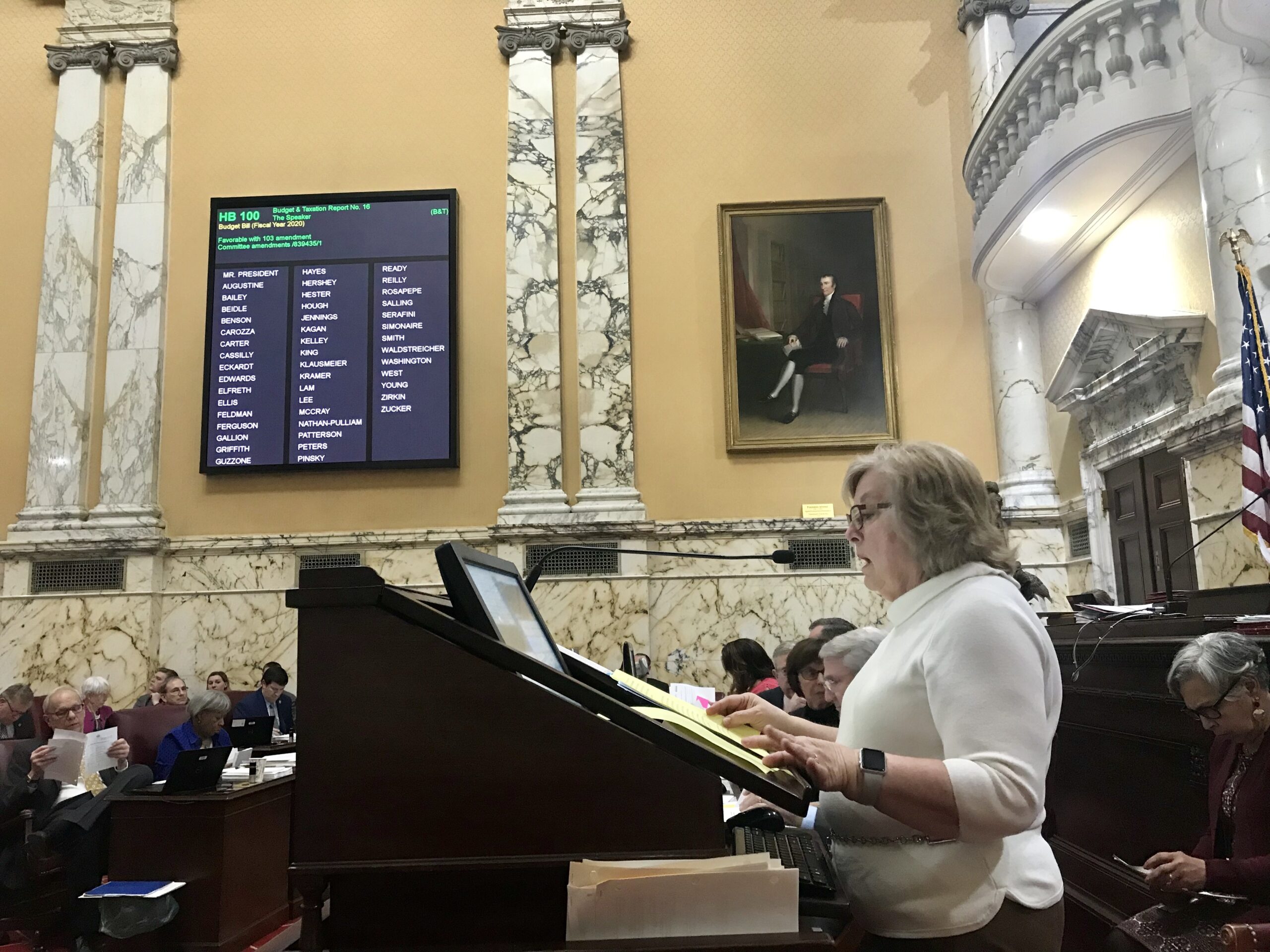Hogan Sounds Alarm on Lawmakers’ Spending as Senate Budget Plan Reaches Floor

As senators got their first look at the chamber’s budget proposal this session on Monday, Gov. Lawrence J. Hogan Jr. (R) blasted what he called reckless and irresponsible spending proposals.
Since lawmakers convened in January, Hogan said, they have put forward $7 billion in new, mandated spending proposals.
“And I am growing increasingly alarmed that their current proposals, if enacted, would cause a $21 billion budget shortfall over the next five years and would impose a devastating and punishing $7,000 tax hike on the average Maryland household,” Hogan said. “This is exactly the kind of reckless, unsustainable and irresponsible behavior that we have been working so hard to reverse. The legislature seems to be attempting to return to the same failed overreach, overspend and overtax policies of the past.”
But by the time Hogan was speaking Monday morning, a chunk of those proposals were already dead. Hogan’s office had calculated the cost of all bills introduced with a financial mandate, regardless of whether or not the bills had moved or were likely to.
“Every bill with a mandate probably won’t pass, number one,” House Appropriations Chair Maggie L. McIntosh (D-Baltimore City) said in the legislature’s defense Monday.
Driving the reckless spending in part, Hogan said, was lawmakers’ determination to direct money to the recommendations of the Commission on Innovation and Excellence in Education, or Kirwan Commission, which is championing a vision for a new education system in the state of Maryland to be implemented over the next decade at an eventual estimated cost of $3.8 billion a year.
The House version of the budget bill includes $320 million for Kirwan Commission initiatives next year; the Senate version of the bill brought to the floor on Monday night would direct a lesser amount, $225 million.
Hogan said Democratic lawmakers are falling victim to “outrageous pandering to special interest groups, while being completely dishonest with parents, teachers, students and taxpayers.”
His office has said implementation of the first $725 million of the Kirwan Commission recommendations would require either a 33 percent increase in the sales tax, a 15 percent increase in the income tax or a doubling of the state’s property tax.
But the Senate’s spending proposal dramatically curtails the funding for Kirwan through 2021 and matches new funding to existing revenues. And McIntosh said Monday afternoon that members of the legislature will spend the summer studying ways to identify additional funding sources. Lawmakers could find revenues through legalizing sports betting or applying online sales taxes to marketplace facilitators like Amazon, McIntosh said.
“There are a number of ways, so it doesn’t necessarily mean raising taxes,” she said.
Hogan’s dire warnings about growing deficits are “a bit of an exaggeration,” McIntosh said.
“And in fact budgets grow every year. Since he’s been governor, the budget’s grown $6 billion. Should I blame that on him?” McIntosh asked. “No. It’s because revenues increase, special funds come in increased, tuition increases. There’s a number of factors that grow budgets. Each year, by the constitution, we have to balance the budget. So we will balance that budget every year.”
Hogan said he was especially concerned about increased school budgets without new oversight, in light of recent ethical lapses within school systems relating to grade-fixing and leadership scandals.
“No additional state tax dollars will be handed over to local school boards without significant accountability measures attached,” the governor warned.
Democrats have proposed the Office of Performance Evaluation and Government Accountability, which would be partly dedicated to oversight of public school systems, including analyses of grading standards, graduation requirements, assessments and procurement, and evaluations of instances of fraud, waste, and abuse. Hogan established the Office of Education Accountability during the last interim and sought to grow that office in this year’s budget, though the appropriation was cut by lawmakers.
“We agree with him on [accountability],” McIntosh said. “…We may not do it the same way he does it.”
Senate Budget and Taxation Chair Nancy J. King (D-Montgomery) called the governor’s criticisms “political jibber.”
King said the committee acted with “fiscal integrity” and took a lot of tough votes to limit Kirwan funding and cut other programs during a budget year that was also marked by a late $268.5 million revenue writedown.
“I’ve had people complaining to me at home about the retiree tax credit bill and why didn’t we fund that? Well, the governor had that bill, but he didn’t put money into the budget for it,” King said.
The $46.6 billion budget proposal in the Senate, which will be debated on Wednesday, increases state spending by less than 4 percent, sends almost $7 billion to school funding and retains $1.3 billion in reserves, King told the chamber Monday night.
“While the House had more ambitious [Kirwan Commission] funding plans, the Senate based its plan on the level of ongoing revenues that makes sure what we commit to this year can be funded next year,” King said.
Sen. Andrew Serafini, a Republican from Washington County and a member of the Budget and Taxation Committee, took a minute on the floor to discuss concerns about the budget after it was introduced.
“I’m concerned about where the House was; I’m very proud of where the Senate is,” Serafini said. “…I’m very proud of this document. Is it perfect? No, it’s not. But it’s something I can feel very proud about as someone who’s fiscally conservative.”




 Creative Commons Attribution
Creative Commons Attribution